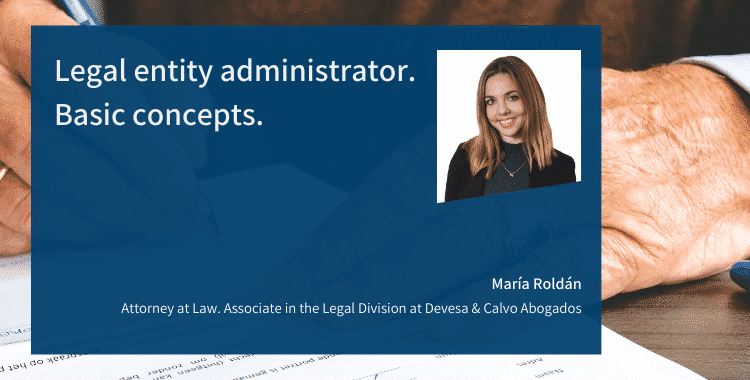
Legal entity administrator. Basic concepts.
There are many doubts that arise when deciding to appoint a legal entity administrator of another company and, for this reason, the matter should be studied in depth before making decisions. Mainly, administrators (or potential administrators) are usually interested in this option to try to protect themselves regarding the liabilities that may arise from its functions’ fulfilment. However, in order to avoid any confusion, it should be pointed out;
-Firstly, it is perfectly possible to appoint a legal entity as an administrator- provided that it is not disqualified or legally incompatible – as this is expressly permitted by article 212 bis of the Capital Companies Law (Ley de Sociedades de Capital (LSC)).
-Secondly, that there is not much difference in liability attribution terms derived from the administration functions between the two cases (natural person director or legal entity administrator), and this is why the latter must necessarily appoint a natural person to perform the inherent functions to the director’s position.
For a better understanding of the matter, it is essential to bear in mind the following characteristics of the natural person’s appointment representing the legal entity administrator:
–The appointment of this natural person representing the legal entity administrator is imperative, and no more than one person may be appointed for this purpose, both for practical and operational reasons.
-The natural person representing the director will be subject to the same duties and responsibilities regime as the legal entity administrator, both being jointly and severally liable (Article 236.5 of the LSC). Therefore, before an appeal, it will not be possible to individualise the fault by exonerating either of them, but rather both must be liable for these concepts, and the injured party or interested party may bring his action indistinctly against one of them or against both of them. *For a more detailed discussion of this issue, see the last section of this article.
-Notwithstanding the foregoing, the relationship between agent and principal is governed by the mandate contract’s rules (Articles 1709 et seq. of the Civil Code), whereby the agent is obliged after the acceptance to fulfil the mandate. If it does not execute it, it will be liable for the damages caused to the principal, or if it does so without following the given instructions.
–The natural person chosen as representative must expressly accept the position, this is because we are dealing with a case of voluntary representation and not a mere power of attorney: the position exercise not only implies the possible execution of the conferred powers, but also the assumption of certain responsibilities.
-The appointment is made on a permanent basis; not for a specific act, but for the natural person representing the company to permanently exercise the administrator’s position inherent functions. Even so, the appointment is revocable, but it must be borne in mind that the natural person representing the legal entity administrator will remain as such until a replacement is appointed, because the company cannot be left without a director (Article 143.1 of the Commercial Registry Regulation (Reglamento del Registro Mercantil)).
–The power to appoint the representative natural person is vested in the administrative entity, so it is the administrative entity itself – represented by its administrative body or by a sufficient attorney – that must formalise the appointment. In the event that the administrative body is a Board of Directors, the appointment must first be recorded in a certificate of the Board of Directors’ meeting minutes.
-Since the appointment of the natural person as representative has the nature of an attorney power, must be recorded in a public document and entered in the Commercial Registry. Only in this way the appointment will have effect against third parties. It is possible, however, that the natural person appointed to exercise the director position is already a legal representative of the managing company (general proxy or director), in this cases we would be dealing with a delegation of powers, so that the attorney power does not need to be formalised in a public document, but only the certification of the delegation agreement issued by the body of the legal person that is competent for this purpose.
-In addition, the identity of the appointed representative must be registered at the same time as the appointment of the managing legal person in the register of the managed company; otherwise, registration will not be effectuated until all these identification details are on record.
Having said the above, and taking into account that the liability attribution regime to the natural person representing the administrator is the one that most concerns our clients, we will now explain the cases in which the natural person’s liability representing the legal entity administrator would operate.
-The natural person, as well as the management company he represents, will be liable in the director’s duties breach established in Articles 225 and following of the Capital Companies Law, such as loyalty duty, the duty to avoid interest conflicts, or the duty to act diligently.
-Similarly, it will be liable in the event that the company is in a dissolution state and (a) the General Meeting has not been called within the deadline to resolve the dissolution, (b) the dissolution has not been judicially promoted, or (c) the company has not filed for insolvency proceedings if appropriate. In this case, both (the administrator and the natural person representing the company) will be liable for the company’s debts.
–According to the current major doctrine, the extension of liability that the LSC makes regarding the figure of the representative natural person and the legal entity administrator would not operate within the insolvency law scope. This theory is mainly based on the fact that the special nature of the rule must mean that it does not extend to other types of areas outside the corporate sphere, such as insolvency law scope. This, if we bear in mind that the extension liability is not explicitly contemplated in the Law, seems to indicate that there is no intention on the part of the legislator to extend it to this area. In any case, we will have to wait for the Supreme Court to establish case law on the matter to ensure that the administrator’s representative natural person is exempt from liability in insolvency proceedings, and always bear in mind that it is possible to assimilate the representative natural person to the de facto administrator, who has been equated to the administrator in insolvency proceedings by the Supreme Court.
Attorney at Law. Associate in the Legal Division at Devesa & Calvo Abogados.
